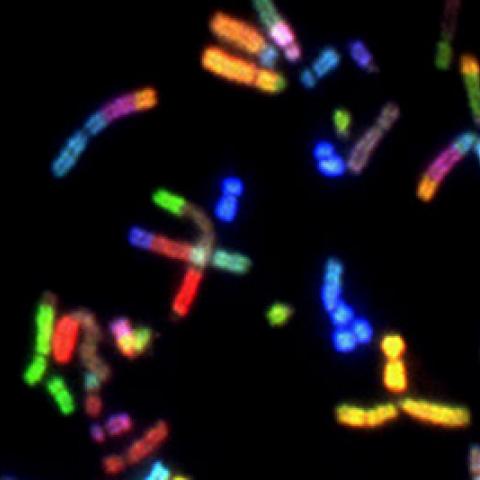
Brain cancer chromosomes
Photo courtesy of NCI Visuals Online
People with glioblastoma multiforme that has not been treated with chemotherapy or radiation may be eligible to participate in a clinical trial at the NIH Clinical Center.
Glioblastoma multiforme (GBM) is a type of brain cancer where treatments include radiation therapy (RT), chemotherapy and surgery, but survival rates are poor. Treating the tumor with high doses of radiation improves outcomes for some patients with GBM, but even adding chemotherapy doesn’t stop the tumor cells from growing back. This indicates that GBM cells are fairly resistant to RT. A team of researchers led by Kevin Camphausen, M.D., Chief of the Radiation Oncology Branch, think that the anticancer drug selinexor may make GBM cells less resistant to RT, which would allow RT to kill more cancer cells. Study patients will be treated daily with RT and temozolomide, a drug that stops cancer cells from making DNA. If cancer cells can’t make DNA, they can’t split into new cells, and if cancer cells can’t divide, they die. Patients will receive selinexor once a week. This drug blocks a factor in cells that stops the body’s ability to pick out and eliminate tumor cells. Selinexor has also been shown to enhance glioma cells’ sensitivity to RT. Researchers want to discover the highest dose of selinexor that people with GBM can tolerate when taken along with temozolomide and RT.
Clinicaltrials.gov identifier: NCT04216329
NCI Protocol ID: NCI-20-C-0027
Official Title: A Phase I Clinical Trial of Selinexor (KPT-330) in Combination With Temozolomide and Radiation Therapy in Patients With Newly Diagnosed Glioblastoma
The Center for Cancer Research is NCI’s internal cancer center, a publicly funded organization working to improve the lives of cancer patients by solving important, challenging and neglected problems in cancer research and patient care. Highly trained physician-scientists develop and carry out clinical trials to create the medicines of tomorrow treating patients at the world’s largest dedicated research hospital on the campus of the National Institutes of Health in Bethesda, Maryland.
For more information on CCR clinical trials click here, and subscribe to have the latest CCR clinical trials sent directly to your inbox.